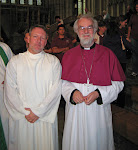Preached on Sunday, January 28th, 2006 at the 'family service' in the Chapel of the Good Shepherd at General Seminary: http://gts.edu/worship.asp
Lectionary readings that this sermon is based on can be found at: http://www.io.com/~kellywp/YearC_RCL/Epiphany/CEpi4_RCL.html
Today we hear in our readings the importance of speaking up and speaking out in the service of God. Jeremiah is afraid that, though God has called him to be a prophet, he is too young and inexperienced to be able to proclaim God’s message.
Jesus reads from the scroll of Isaiah in the synagogue in his hometown, and the people are astounded at his erudition and his ‘gracious words’. And they’re kind of intimidated by Jesus and feel he’s “putting on airs”. But Jesus knows that he has been called to a special ministry by God. He reminds the people in the synagogue that in Elijah’s day and in Elisha’s day, miracles were performed by the prophets for the glory of God. And the beneficiaries of those miracles were just two of many people who were chosen by God as were the prophets themselves.
In John’s gospel, chapter 15, Jesus is quite clear: “You did not choose me, I chose you. And I appointed you to go and bear fruit.”
So even if, like Jeremiah, we are frightened and feel unprepared, we must still speak. And even if, like Jesus, those closest to us find us a bit unbelievable in the role of God’s ‘mouthpiece’, we must still speak God’s truth to the world.
Words are very important in our tradition. Again in John’s gospel we learn that ‘In the beginning was The Word, and the Word was with God and the Word was God. And the Word became flesh and dwelt among us.”
And in Genesis we read that God creates the heavens and the earth primarily through the power of speech. God said, “Let there be light” and “Let the earth put forth vegetation” and it came to pass.
So, words are powerful, and speaking up and speaking out is a powerful way we can serve God in the world.
But what is it we should say? When should we speak up? How can we speak God’s message to the world? What words should we use, who should we speak to on God’s behalf?
Well, Jesus always welcomed everyone, whether an old friend or a stranger. So, when we see the new kids at school and they seem shy or haven’t made any friends yet, we can say “Welcome” and be friends with them.
When we see injustice in the world, it’s really important to speak up. Whether it’s the war in Iraq, or the inequities of the curriculum, we need to speak the truth on God’s behalf and remind our government that war is wrong, and remind our professors that women have played an important part in the salvation history and continue to do so.
We need to speak the truth when it makes us vulnerable. And we need to speak the truth in love and with kindness when others are vulnerable.
We must always speak up when something seems not right, or makes us uncomfortable, or makes us sad. Sometimes people try to stop us from speaking up, or try to scare us into not telling the truth. Older kids and even grown-ups sometimes, can bully us, or ask us to do things or touch us in ways that make us feel uncomfortable.
That’s when we have to say, ‘No!’ and ‘Stop it!’ And then tell a teacher or our parents what happened. Sometimes older kids or a grown up might try to scare us, might tell us that we’ll get in trouble or our parents will get mad if we tell the truth. That’s when we really should find an adult that we know and trust and tell them what happened right away.
Following Jesus means speaking up, it means telling the truth. And God will provide us with the words we need and the confidence to speak our truth, and God’s truth.
Now, before I leave a loophole here that will ruin family dinners and embarrass too many parents, let’s have a few criteria for speaking up and speaking out. Ask yourself three questions:
Does it need to be said?
Does it need to be said now?
Does it need to be said by me?
Chances are that, if everyone is seated at the table for Thanksgiving dinner and you’ve just realized that Grandma has a mustache, this particular truth might not pass the three question test I’ve just spelled out.
Like Jeremiah, we may be young and intimidated and maybe even afraid. But God is stronger than we are, and God will always help us to speak up and to speak out on behalf of others who are in trouble and on our own behalf when we are in trouble or hurt or feeling vulnerable.
Let us pray: Mother Father God, help us to speak up and to speak out on behalf of your children and your gospel truth. Plant your truth in our hearts, and give us the words to speak the truth of your caring love to all the world. Amen.
28 January 2007
Sermon for Epiphany 4, Year C: "Speaking Up and Speaking Out"
Subscribe to:
Post Comments (Atom)







No comments:
Post a Comment